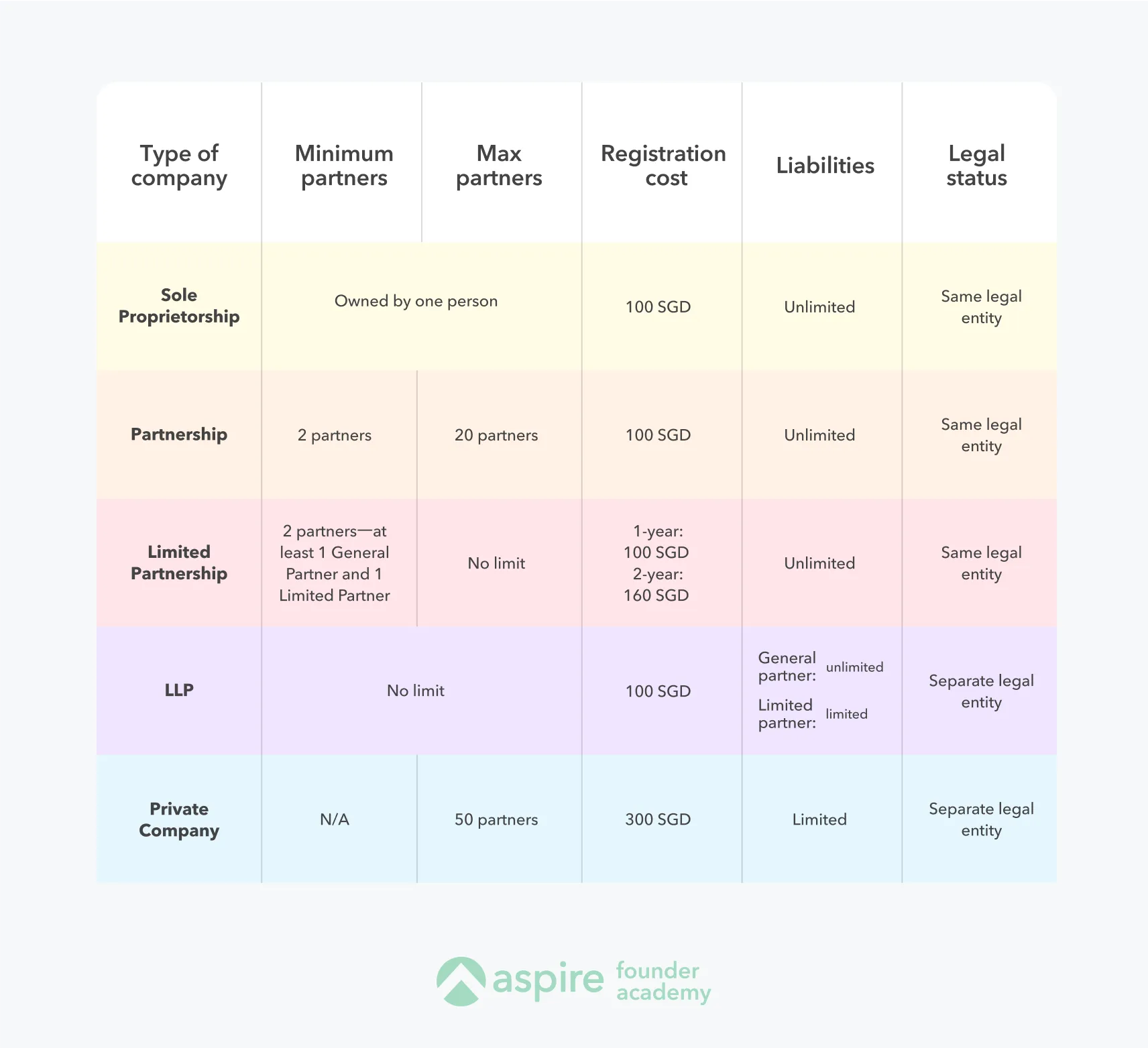Summary
Singapore is one of the friendliest places to start a business and attract investors. Before you get started, however, there’s one important thing to cross off your list: Deciding on the type of business entity for your start-up.
This is important because it determines the level of risk you’re willing to bear, how many business partners you need to appoint, and the amount of tax you’ll have to pay.
Finally, the type of business entity plays a key role when it comes to dissolving the business if things don’t work out.
In Singapore, there are five main types of business entities to choose from, namely:
Sole proprietorship
Sole Proprietorship is a business type owned by one person. The sole business owner has full control over how they run their business. Moreover, it is the simplest business entity to set up as you won’t be expected to do regulatory formalities such as annual audits and filing financial statements.
Sole Proprietorship comes with a few disadvantages, however.
Firstly, it exposes the owner to the most financial risk as they are not regarded as a separate legal entity. This means that if you’re a sole proprietor, you’ll be personally liable should the business incur any debts. Consequently, your personal assets may be at risk should the business fail to pay off its loans and liabilities.
Secondly, there is no protection in the event of being sued because you and the business are inseparable.
Partnership
If your business has at least two owners, you can consider a Partnership.
The owners should not necessarily be individuals. In fact, they can also be another company or a limited liability partnership, as long as the total owners are capped at 20.
While the risk is not as high as a sole proprietorship, the exposure to personal liability is the same as legally, the business is not separate from its business owners.
Limited Partnership
A Limited Partnership means that at least one of the business partners assumes limited liability in relation to their investment as well as an inability to participate in the management of the business.
The general partner, who doesn’t have limited liability, bears all the risk and liabilities borne by the business but is able to have full reigns of the business.
Limited Liability Partnership
A Limited Liability Partnership is a type of business entity that will legally protect you from personal liability.
It’s the perfect business entity for certain professions (e.g. lawyers and accountants) who wish to establish a joint practice.
A Limited Liability Partnership will give you the perks of a private company while you enjoy the flexibility of a lean partnership. You and your partner(s) will not be held liable for any of the LLP’s business debts.
LLPs also allow you to own property in your LLP’s name.
Finally, they come with perpetual succession. This means that even if your business partners leave or change, it has no effect on the LLP’s liabilities, rights and existence, as long as there are at least two partners at any given time.
Private Company
Incorporating as a private company is a top choice among entrepreneurs and for good reason. A Private Company is the most flexible, scalable and advanced type of business on the list.
In a Private Company, shares can be held by not more than 50 members and you can be assured of limited liability as the private limited company is seen as a separate legal entity.
The figurative icing on the cake is that you enjoy a variety of sweet tax exemptions, including dividends tax exemption for the company’s shareholders. Similar to an LLP, private companies enjoy perpetual succession and are able to own property under the company’s name.
The catch? Setting up a private company is a lengthy process. You need to take care of more admin, including appointing an auditor and secretary within months of the incorporation. You will also have more responsibilities to ensure bookkeeping is in order and that your Annual Returns are filed on a timely basis.

Which type of business entity should you choose?
While setting up a private limited company would be the most beneficial in the long run, there is certainly no right answer as each business has its own finance and accounting requirements. Here are some key considerations to keep in mind before taking the plunge:
- The long term goal for your business
- The amount of capital required to set up the business
- The number of business owners
- The level of risk and liability you’re willing to bear
- The advantages and disadvantages of the respective entities
- The requirements once the business is incorporated
Once you have the answers to these questions, you’re all set up to start your business.










%201.webp)


.webp)